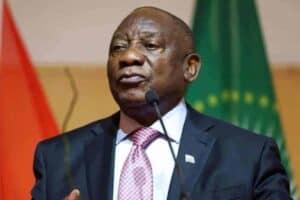Union claims to have moved government ideologically.

At a media briefing on July 10, trade union Solidarity announced that it has suspended its plans to bring a court application for the national carrier to be placed under business rescue.
It claimed that this follows a major victory when South Africa Airways (SAA) CEO Vuyani Jarana agreed to immediately commence with the search for a strategic equity partner (SEP) for the struggling airline.
The earlier position was that SAA would first be restored to profitability before introducing an equity partner by selling a percentage of shares in the airline.
Head of Solidarity Research Institute Connie Mulder in fact stated that government moved from an “ideologically entrenched position” of centralism towards privatisation, presumably under threat of Solidarity’s pending court application.
He proposed that one of the super connectors, the Gulf airlines, or an African airline like Kenya or Ethiopian airlines could be considered as a SEP. The latter would be part of a strategy to develop a West-African aviation hub.
It would have to be a partner who brings aviation expertise in exchange for some executive control over SAA and “not one or two percent sold to the Public Investment Corporation”, Mulder said.
A closer look at what Jarana wrote in his letter to Solidarity shows that he gave general, high level undertakings with no deadlines.
Solidarity asked:
“That it be an immediate priority of SAA to recruit a strategic equity partner for purposes of private equity and that a deadline is set for this to happen;”
Jarana says in response the SA government and SAA board have agreed to begin looking for such a partner and offers to share the project plan with Solidarity once it is finalised. He then states: “We can project the start of the process however we cannot guarantee whether there will be appetite in the market. We therefore would not be able to commit to deadline for completion of the SEP process, it depends on the market.”
Solidarity further asked:
‘That SAA is not to first self-correct, after which a SEP would be sought. That a SEP be an immediate priority;”
In response Jarana says SAA’s management believes that “getting SAA into shape is an important step in making it attractive to potential Strategic Equity Partners”. He continues to say that due to funding pressure the government, as shareholder, SAA board and management have agreed to immediately start the search.
Solidarity then asks:
“That the further capitalisation of SAA be borne largely by the SEP;”
Jarana answers: “While this is desirable it will depend on the structure of the SEP transaction, the extent of private sector participation and timing of the conclusion of the SEP transaction as well as the valuation of the stake that government will sell to a SEP.”
In comment after the Solidarity press briefing SAA spokesperson Tlali Tlali added: “We do not have details at this stage as to the size of the stake and the commencement date, should this option prove to be a viable proposition.
We will take our cue from the shareholder on such details.”
Jarana earlier told a parliamentary portfolio committee that SAA needs R21.7 billion over the next three years to return to profitability.
It seems as if Solidarity is saying SAA should find a company that is willing to fund this fully or to a large extent in the hope that the turnaround would work.
The government and the SAA board seem to agree, most likely because they cannot see that kind of money flowing to SAA from the fiscus. It is therefore probably its empty pockets, rather than an ideological turnaround, that has led to the view that the SEP search should be expedited.
Jarana and his management team, however, are not so sure this is possible…
Transport economist Joachim Vermooten earlier told Moneyweb that it will be much more efficient to wind down SAA in its current form and start a new, focused airline, free of all the legacy contracts, over-staffing, inefficiencies and culture of reliance on the shareholder.
The crucial question for any prospective equity partner would revolve around value and the alternative that Vermooten suggests could very well make better sense that investing in SAA in its current form.
To be profitable and compete with its peers, SAA needs new aircraft. It cannot buy new aircraft, because nobody would lend it money on the basis of its weak balance sheet. Jarana called it a “catch 22”.
Solidarity says it could still bring the business rescue application, should SAA not stick to the plan. The union admits it is sceptical about SAA’s undertakings and won’t be surprised if the application proceeds within a year.
Free Market Foundation executive director Leon Louw however rejects business rescue as a viable option for SAA. He earlier said the scale of the amount of money required (to save SAA) is so gargantuan that it can never be fixed “and it will certainly never be a going concern able to compete in the world of modern aviation”.
Brought to you by Moneyweb
Support Local Journalism
Add The Citizen as a Preferred Source on Google and follow us on Google News to see more of our trusted reporting in Google News and Top Stories.






